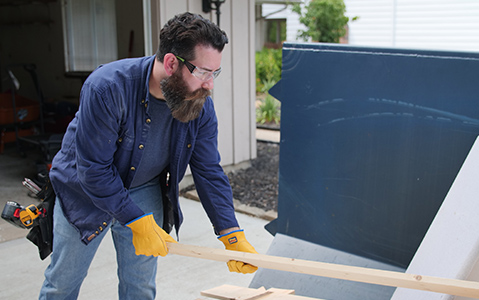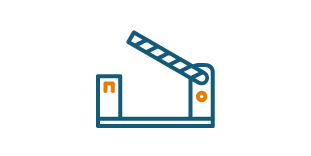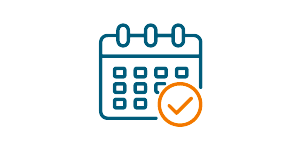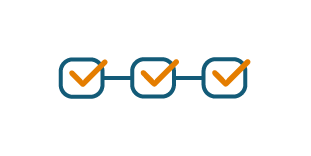
Dumpster Fees
What They Mean and How to Avoid Them

What is a Dumpster Fee?
A dumpster fee is any time we have to charge you for something outside of your originally quoted flat-rate price. There are a few types of dumpster fees that can happen, but we never want your final invoice to surprise you. Take a few minutes to familiarize yourself with each fee so that you know what to expect.

Types of Dumpster Fees
Trip Fees
Price Range: $195-$350
Trip fees, also known as dry-run fees, happen if we can’t deliver or pick up your dumpster for any reason. We charge trip fees because they put our drivers behind schedule and disrupt their originally scheduled route. Trip fees are charged within 30 days after your final pickup.
How Can I Avoid a Trip Fee?

Prepare the Delivery Spot
Before our truck arrives, move cars, equipment and basketball hoops out of the way. You should also open any entry gates to your property and make sure the area is clear of low-hanging wires and branches. You may also mark your drop-off spot with cones or plywood, but it isn't necessary. Trip fees can also be charged if the dumpster needs to be moved after delivery. If you’re planning to keep your roll off dumpster on public property, you also need to get a dumpster rental permit before delivery.

Make Sure You Have Enough Space
The amount of space we need for deliveries and pickups depends on the dumpster size you order. However, our driver can usually work with the following dimensions:
• 23 feet of vertical clearance.
• 10.5 feet of width.
• 60 feet of space in a straight line.

Fill Your Dumpster Properly
You’ll receive a trip fee if debris sticks up over the top or hangs over the sides of your dumpster when we return for pickup. To efficiently use space in your container, we recommend loading your large and heavy items first. Walk these materials into your bin through the swinging door, spreading them apart to distribute their weight evenly. Then, you can toss small and light objects over the edges to fill in any gaps. When you’re finished cleaning up, make sure your items are completely below the fill line. This ensures we can haul your trash away safely.

Stay Below the Maximum Weight Limit
In addition to the weight limit included in your flat-rate price, all our roll off dumpsters have a maximum weight limit of 10 tons. Transporting over 10 tons is a hazard to our haulers and other drivers on the road. If your dumpster is too heavy to pick up, we’ll ask you to remove some trash from the bin. You’ll also get a trip fee if our driver has to come back later. To avoid going over the maximum weight limit, let our team know if you’re disposing of heavy debris, like concrete, dirt or bricks. We may also ask you to only partially fill your dumpster, just to be safe.
Extension Fees
Price Range: $15-$50 per day
Cleanup taking longer than you thought? You can usually extend your dumpster rental period for a flat daily rate. The cost of this charge depends on where you’re located and size availability at the time of your order.
How Can I Avoid an Extension Fee?

Stick to Your Original Timeline
Our rental periods are usually between seven and 10 days long. You’ll know the exact length of your rental when you place an order, and sticking to this timeframe is the most effective way to avoid extension fees.

Schedule Your Pickup on Time
You can request pickup at any point during your cleanup, even if you’re ahead of schedule. Simply submit this quick online form, and we’ll come back for the mess as soon as we can. To keep extension fees off your invoice, schedule your pickup before the last day of your rental period.

Ask About Our Extended Rental Periods
Already know you’ll need more time with your container? You can pay for an extended rental upfront. If you’re planning a lengthy project, ask about our longer rental periods before scheduling delivery.
Overage Fees
Price Range: $50-$250 per ton
Your quoted price includes a weight limit that reflects the tonnage of debris you can throw away without getting an overage fee. Landfills charge disposal costs by the ton, so going over this limit will result in an additional per-ton fee, prorated by the pound. We make sure you only pay for the tonnage you use, which is why we don't charge for extra tonnage upfront. You should see this charge within 30 days after your final pickup, but it can take up to 120 days to be charged, depending on when we receive your weight ticket from the landfill.
How Can I Avoid an Overage Fee?

Choose the Right Size and Weight Limit
You can easily avoid overage fees by renting the right dumpster for your materials. If you’re not sure which size bin is best for your project, use our weight calculator to estimate how heavy your materials are before ordering. Our team will also make an expert recommendation when you call.

Understand Your Weight Limit
All our dumpster rentals have a set weight limit that reflects the tonnage of debris covered in your quoted price. Staying within it helps keep overage fees off your invoice. If you’re tackling a heavier project, ask about our higher weight limits when you place an order. When you have more tonnage to work with, you’re less likely to get an overage fee when tossing concrete, brick and other heavy materials. Getting rid of lighter materials? Debris weight adds up quickly, and it's easy to underestimate how much you’re throwing away.

Cover Your Dumpster When Not in Use
Overage fees are even more likely if you’re expecting heavy rain or snow during your rental period. This is especially true if you’re tossing carpet, upholstered furniture and other absorbent materials. Rainwater can soak those materials, making them heavier. We recommend securing a tarp over your container with bungee cords or tie-down straps before a storm.
Disposal Fees
Price Range: $25-$200 per item
Disposal rules and regulations vary by location. You can get a disposal fee for three different reasons:
• Disposing of something that’s hard for the landfill to process.
• Tossing prohibited items.
• Putting hazardous waste in a dumpster.
Learn more about disposal fees and how to plan for them, or keep them off your invoice.
How Can I Avoid a Disposal Fee?

Know Item Restrictions
Item restrictions vary from state to state and even city to city. It takes longer for landfills to process some items, such as appliances, mattresses and electronics. This makes their disposal more expensive. When you order, our team will let you know about any per-item fees in your area. While you won’t be charged until after your dumpster has been picked up, you can budget ahead for the disposal fee. Or, you can find another way to get rid of these items.

Don’t Throw Away Prohibited Items
While we accept most debris types, we can’t take prohibited items off your hands. This includes oil, asbestos, paint and other materials that pose a safety concern in landfills or may damage your container. Tossing these items will result in an additional per-item fee, or a trip fee if our driver can’t haul the bin away.

Dispose of Hazardous Waste Properly
For safety reasons, you can’t throw flammable and hazardous waste in our dumpster rentals. These materials are dangerous to touch and may harm the environment if disposed of improperly. Read through our guide on how to dispose of hazardous waste if you’re tossing household chemicals, batteries and similar items.
Cancellation Fees
If you need to cancel your dumpster delivery or pickup, let us know as soon as possible. It's free to cancel up until 3 p.m. the day before your service. After that, you'll have to pay a $150 cancellation fee to cover the cost of rerouting our drivers.
Additional Dumpster Fees

Dig-Out Fees
If you live in a frigid climate or experience particularly cold winters, you can get a dig-out fee. This only occurs when an item inside your dumpster is frozen, and must be removed with additional machinery. This fee typically costs $75, and you’ll be charged after we haul your dumpster away.

Tow Fees
If your dumpster sinks into the ground and is difficult for our driver to remove, you’ll get a tow fee. Tow fee costs vary by market, but you’ll be charged as soon as possible. You can avoid this charge entirely by choosing a flat, paved surface for your dumpster delivery.

Wait Fees
You’ll receive a wait fee if you delay your dumpster delivery or pickup after the driver has arrived. The cost of this fee varies by market, and you’ll typically be charged each hour we have to wait. Expect to see this charge directly after the delayed service.
Other Services That May Cost Extra
While not dumpster fees, there are other services with additional costs. If you’re planning to use one, make sure to budget for it.
Empty-and-Return Service
Fill your roll off container sooner than expected? Use our empty-and-return service to swap your full dumpster for a new one. Just submit this form online, and we’ll have a new bin headed your way ASAP.
Ordering More Than One Dumpster
As long as we have availability, you’re welcome to rent multiple dumpsters at one time. We recommend ordering more than one container if you’re working on a large-scale project, like a major home remodel or commercial construction job.
Permits
If you’re planning to keep your dumpster in the street or blocking the sidewalk, you might need a permit from your local government. While not as common, you may also need city permission to have the container on private property. This includes your driveway or jobsite. Check out our permits page for more information, or contact our team if you have specific questions.
Clean Up Mindfully to Avoid Dumpster Fees
Now that you know about our most common dumpster fees, keep them in mind as you clean up. If you have questions about any unexpected charges on your invoice or want to clarify anything before renting a dumpster, get in touch with our team.